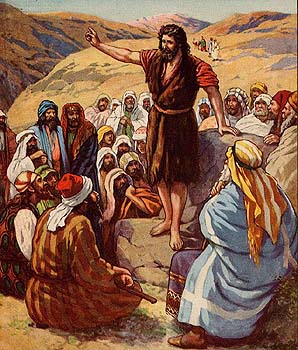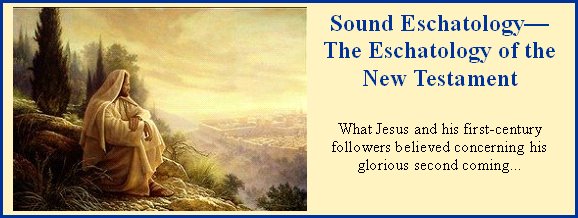
The closing words of the Old Testament is where we will begin as this sets the stage perfectly for the tone and undercurrent of this topic.
John the baptist was the first sign that the great "Day of the Lord", as prophesied throughout Jewish history, had finally arrived. Malachi (the final prophet recorded in the Old Testament) in the last few verses of his short book, prophesied that John the baptist's ministry would mark the arrival of the long-awaited great "Day of the Lord":
"Lo, I am sending to you Elijah the prophet, Before the coming of the day of Jehovah, The great and the fearful. And he hath turned back the heart of fathers to sons, And the heart of sons to their fathers, Before I come and have utterly smitten the land!" (Malachi 4:5-6, Young's literal translation)
These fearful words rung in the ears of the Jews for centuries (there was no more prophetic utterance recorded after that) until John came on the scene, announcing the arrival of the Messiah and the final judgment on the disobedient twelve tribes of Israel. When the angel met Zacharias in the holy place in the temple one year before John's birth, as recorded in Luke 1, he foretold that John would be the fulfillment of Malachi's prophecy:
"And he shall go before him in the spirit and power of Elias, to turn the hearts of the fathers to the children, and the disobedient to the wisdom of the just; to make ready a people prepared for the Lord. " (Luke 1:17)
Years later, when John went about preaching and baptizing in the wilderness of Judea, he himself declared to the people:
"As it is written in the book of the words of Esaias the prophet, saying, The voice of one crying in the wilderness, Prepare ye the way of the Lord, make his paths straight... Then said he to the multitude that came forth to be baptized of him, O generation of vipers, who hath warned you to flee from the wrath (about) to come?... And now also the axe is laid unto the root of the trees: every tree therefore which bringeth not forth good fruit is hewn down, and cast into the fire." (Luke 3:2-9, see Greek text for the word 'mello', or 'about to')
Later Jesus sealed this truth (that the arrival of John was the fulfillment of the final words of Malachi and so marked the great day of the Lord and the end of the age) by saying:
"For all the prophets and the law prophesied until John. And if ye will receive it, this is Elias, which was for to come. " (Mat 11:13-14)
Jesus indisputably recognized that John the baptist's ministry fulfilled the words of Malachi the prophet. The end of the age had arrived (1 Cor 10:11, Heb 9:26, 1 Pet 1:20), the kingdom of God was "at hand" (which is what Jesus went everywhere proclaiming), and the great day of the Lord's judgment was finally upon them (James 5:8, 2 Thes. 2:2, Heb 10:37, Rom 13:11-12, 1 Pet 4:7, 1 Cor 7:31). I highly recommend reading those passages I just listed with this first-century time-frame in mind (and these are just a few of the many imminency statements recorded among the first century church). This is the consistent theme of the eschatology of the New Testament. The end of the age, the second coming of the Lord, and the great day of the Lord's judgment were not for some distant time and culture (like many modern prophecy teachers theorize), but rather were first century events which would be experienced firsthand by the apostles and the infant Christian church.
To be frank, what we believe is irrelevant -- this is what Jesus Christ, John the Baptist, the original Apostles, and the infant first century Church firmly believed (and it is plainly evident throughout their teachings & writings) on this important subject. Either they were all completely deceived (including Jesus), or they knew something on this subject that we tend to miss...
I must vouch for the latter.
In the next installment, we will jump into some of Jesus' own most revealing time statements regarding his second coming!
John the baptist was the first sign that the great "Day of the Lord", as prophesied throughout Jewish history, had finally arrived. Malachi (the final prophet recorded in the Old Testament) in the last few verses of his short book, prophesied that John the baptist's ministry would mark the arrival of the long-awaited great "Day of the Lord":
"Lo, I am sending to you Elijah the prophet, Before the coming of the day of Jehovah, The great and the fearful. And he hath turned back the heart of fathers to sons, And the heart of sons to their fathers, Before I come and have utterly smitten the land!" (Malachi 4:5-6, Young's literal translation)
These fearful words rung in the ears of the Jews for centuries (there was no more prophetic utterance recorded after that) until John came on the scene, announcing the arrival of the Messiah and the final judgment on the disobedient twelve tribes of Israel. When the angel met Zacharias in the holy place in the temple one year before John's birth, as recorded in Luke 1, he foretold that John would be the fulfillment of Malachi's prophecy:
"And he shall go before him in the spirit and power of Elias, to turn the hearts of the fathers to the children, and the disobedient to the wisdom of the just; to make ready a people prepared for the Lord. " (Luke 1:17)
Years later, when John went about preaching and baptizing in the wilderness of Judea, he himself declared to the people:
"As it is written in the book of the words of Esaias the prophet, saying, The voice of one crying in the wilderness, Prepare ye the way of the Lord, make his paths straight... Then said he to the multitude that came forth to be baptized of him, O generation of vipers, who hath warned you to flee from the wrath (about) to come?... And now also the axe is laid unto the root of the trees: every tree therefore which bringeth not forth good fruit is hewn down, and cast into the fire." (Luke 3:2-9, see Greek text for the word 'mello', or 'about to')
Later Jesus sealed this truth (that the arrival of John was the fulfillment of the final words of Malachi and so marked the great day of the Lord and the end of the age) by saying:
"For all the prophets and the law prophesied until John. And if ye will receive it, this is Elias, which was for to come. " (Mat 11:13-14)
Jesus indisputably recognized that John the baptist's ministry fulfilled the words of Malachi the prophet. The end of the age had arrived (1 Cor 10:11, Heb 9:26, 1 Pet 1:20), the kingdom of God was "at hand" (which is what Jesus went everywhere proclaiming), and the great day of the Lord's judgment was finally upon them (James 5:8, 2 Thes. 2:2, Heb 10:37, Rom 13:11-12, 1 Pet 4:7, 1 Cor 7:31). I highly recommend reading those passages I just listed with this first-century time-frame in mind (and these are just a few of the many imminency statements recorded among the first century church). This is the consistent theme of the eschatology of the New Testament. The end of the age, the second coming of the Lord, and the great day of the Lord's judgment were not for some distant time and culture (like many modern prophecy teachers theorize), but rather were first century events which would be experienced firsthand by the apostles and the infant Christian church.
To be frank, what we believe is irrelevant -- this is what Jesus Christ, John the Baptist, the original Apostles, and the infant first century Church firmly believed (and it is plainly evident throughout their teachings & writings) on this important subject. Either they were all completely deceived (including Jesus), or they knew something on this subject that we tend to miss...
I must vouch for the latter.
In the next installment, we will jump into some of Jesus' own most revealing time statements regarding his second coming!

No comments:
Post a Comment